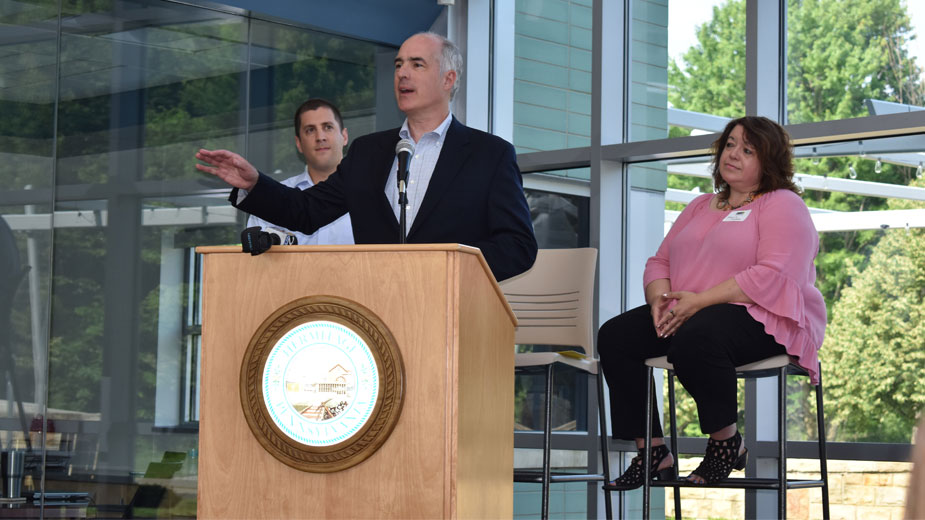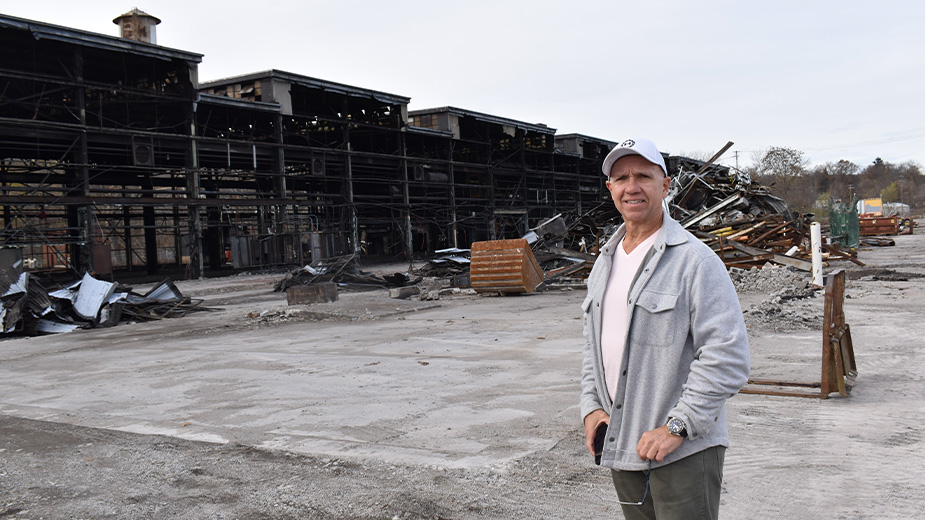Casey Stresses Need for Rural Broadband
HERMITAGE, Pa. — More needs to be done to expand broadband access to rural counties like Mercer County, U.S. Sen. Bob Casey said Monday.
Casey, D-Pa., visited the eCenter@LindenPointe to address the broadband issue, including what is being done at the federal level and what should be done to expand that access.
Of Pennsylvania’s 67 counties, only 19 are considered urban counties, with the rest being designated rural. In those 48 counties, 471,255 residents – or 17% of the population – lack broadband access. In Mercer County, the percentage is even higher – 22%, or 11,109 individuals.
“That is just unacceptable in the United States,” Casey said. That inequity prevents kids form learning at the rate they should be able to learn and prevents small businesses from growing, he said.
The Northwest Pennsylvania Broadband Committee, which covers an eight-county region that include Mercer and Lawrence counties, recently scored the region’s overall broadband and technology readiness at 57.9 out of a possible 100 points, reported Sherris Moreira, executive director of the Shenango Valley Chamber of Commerce.
Among the impacts inadequate broadband access has on the region is the prospect of losing businesses to other areas, said Gray MacKenzie, the eCenter’s entrepreneur-in-residence.
MacKenzie, co-founder of GuavaBox, a website design and inbound marketing agency he started in college seven years ago, relocated his company to Virginia from Crawford County, Pennsylvania for a few years because there was no access to high-speed internet.
Another impact that flies under the radar is mindset, he continued. “When you’re doing market research, you realize there is a big gap between someone without access to internet versus most of the world,” he said.
Without access to broadband, farmers in underserved areas are at a “continuing disadvantage,” as the technology that is employed in other parts of people’s lives is applied to agriculture as well, Casey said.
“That’s the good news. The bad news is that if that farmer or that business doesn’t have high-speed internet, doesn’t have broadband, is not connected, then they won’t be able to deploy those new technologies that will help them with farming,” he said.
According to Moreira, agriculture is Mercer County’s top industry, representing $82.65 million of its annual economic impact. “We need full access to broadband to allow our farming industry to embrace modern technology and to reach customers around the world, and we need to compete on a national and international stage,” she said.
“We work with a lot of food producers, farmers and very small businesses,” said Maggie Horne, director of the Gannon University Small Business Development Center. “If they are not connected, they cannot grow their business. They can’t even think of launching a business if it’s going to be affected by their lack of communication with customers and suppliers.”
Casey called for continued spending on incentives for companies to deploy broadband infrastructure in rural and high-cost areas. Such incentives include federal grant and loan programs like the Federal Communications Commission’s Connect America program as well as loan and grant programs under the U.S. Department of Agriculture.
The omnibus spending bill approved in March included a $600 million pilot program to expand broadband to rural areas that lack such service, he said. The senator said he has been pushing Agriculture Secretary Sonny Purdue to finalize the framework for the program.
“It’s just a pilot program but it’s good for the nation,” he said.
The farm bill recently passed by the Senate – which awaits approval by the House of Representatives – authorized increased funding for broadband grants, loans and loan guarantees.
“We also need to make sure broadband is affordable,” he said. That means supporting initiatives such as the FCC’s E-rate program, which subsidizes broadband expenses for schools and libraries. The program can pay up to 90% of the connectivity costs, he said.
“It’s pretty crazy to go to the library and see how many people are there specifically to use the internet,” MacKenzie said.
Having the libraries available is a benefit for businesses that lack internet access, Gannon agreed, but having to wait until they have time to travel to the library during its open hours can create a lag time. A customer waiting on a response might move on to the next potential supplier, she said.
“It’s absolutely crucial that we have internet access for folks,” MacKenzie said. “There’s a lot of different opinions on how we actually implement that.”
“We need a national investment to bring high-speed internet to all these communities that don’t have it,” Casey said. “The best way to do that, in addition to traditional incentives, is to have a much more substantial infusion of help from an infrastructure bill.”
Speaking with reporters following the presentation, Casey said he hoped President Donald Trump would expand his consideration of candidates to succeed Supreme Court Justice Anthony Kennedy from the list compiled by conservative interest groups during the 2016 presidential campaign.
Democratic senators “need to give this nomination the kind of scrutiny and review that it warrants,” he added.
“You’re talking about a lifetime appointment to the most powerful, most important court in the world,” he continued. “It would be better if we waited until after the [midterm] election, but [Senate Majority Leader Mitch McConnell, R-Ky.] seems to be committed to having a vote in the fall, so if that’s the case we need to spend July and August and into September reviewing the person’s qualifications, their character, their philosophy and a whole range of considerations that are brought to bear.”
Asked how voters in Pennsylvania view the president – who won Pennsylvania in his 2016 victory – and his policies today, opinions vary “depending on where you are,” Casey said. Most expect the president and members of congress to focus on “basic issues” such as growing wages, job creation and preserving existing jobs, he said.
“The story of American life over the last generation which is most upsetting for people is that the middle class has been squeezed, and the size of the middle class has actually decreased,” he said. “A lot of that is due to lack of wage growth. They expect us to focus in a bipartisan way on those issues.”
Efforts to address the hot topic of immigration should work toward the comprehensive reform legislation that the Senate passed with 68 votes five years ago but was not taken up in the House, Casey said, as well as fix the Deferred Action on Childhood Arrivals policy. He further called on the president to change the “zero tolerance” policy he has taken regarding arrivals at the nation’s border.
Pictured above: (Left) Gray MacKenzie, co-founder of GuavaBox andeCenter@LindenPointe entrepreneur-in-residence; U.S. Sen. Bob Casey, D-Pa.; Sherris Moreira, executive director of the Shenango Valley Chamber of Commerce.
Copyright 2024 The Business Journal, Youngstown, Ohio.



